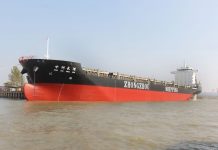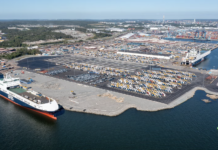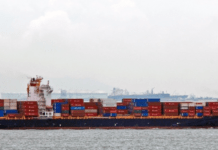
With record deliveries of container ships expected this year and next, most analysts have predicted further heavy downside pressure on container shipping freight rates to be offset by carrier efforts to reduce capacity by slow steaming and layups or, alternatively, by a self-destructive scramble for market share.
However, Jan Tiedemann, head analyst at Alphaliner, believes a very different picture might play out in the coming years as a deluge of new vessels enter service.
“The thing that makes me at least a bit hopeful is that, for the first time, maybe in history, or in the history of container shipping, we’re coming towards a point where some of the orderbook might not be for growth, but actually for replacement,” he told the latest episode of The Freight Buyers’ Club podcast.
Alphaliner forecasts that a record 385 vessels totalling 2.22 million TEU capacity will be delivered this year. This new high mark for box ship deliveries will then be immediately broken in 2024 when a further 391 ships of almost 3 million TEU capacity is forecast to enter service, including 113 ships of over 12,500 TEU capacity.
Tiedemann notes that global fleet capacity is now around 26 million TEU, up from 6 million TEU just 20 years ago.
“For the last 20 years the global container fleet has grown by roughly 1 million TEU every year,” a rate he believes is unsustainable in the coming years given the previous success of containerisation penetration and the lack of new markets to target,” he noted.
He argues that for the first time, many new deliveries have been purchased primarily as replacements for older, less safe, less clean and less efficient ships rather than to enable the expansion of containerisation. Instead, he predicts rising vessel scrapping in the coming years, including of ships as young as 15 years.
“There will still be growth in the market, but to some degree, growth in container shipping is maxed out because there’s no more geographies to expand into,” he pointed out.
Tiedemann went on to explain, “There’s not much more slow steaming you can implement because you’re already slow steaming. There are no more commodities you can really expand container shipping into because everything is already containerized with very, very few exceptions.
“So, we will see maybe for the first time on a big scale – on a global scale – in the next five to 10 years, a fleet renewal and vessel replacement scheme which means that a [lot] of tonnage will have to go to scrap. And that could concern ships – depending on how the economy and how the trade fares – which are maybe barely even 15 or 20 years old at some point.”
If lines do not start accelerating the scrapping of vessels, they will very soon have few deployment options left open, according to the analyst. who said, “There are so many ships ordered that the answer to the question, ‘Where are they all going to go?’ needs to be, ‘Everywhere.’ Every trade will have to absorb these ships.”








